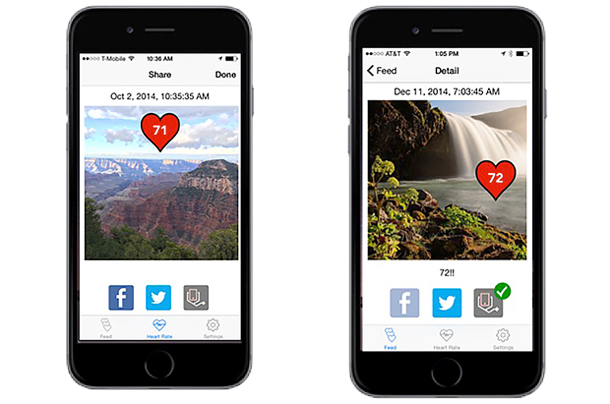Heart health goes mobile and social with the release of BioGram, a new mobile app that is the first to allow heart rates to be shared with a photo.
Created by the cardiologist experts at the USC Center for Body Computing (CBC) along with collaborators at the USC Viterbi School of Engineering and private companies AliveCor and Medable, the free app is available now for download on iTunes.
BioGram works by stamping heart rates onto photos that can be posted to Facebook and other social media. The user’s heart rate is recorded from AliveCor’s Heart Monitor, a portable heart rate monitor built into a smartphone case that records, displays, stores and transfers electrocardiogram (ECG) rhythms wirelessly. For those without an ECG reader, heart rates can be input manually or from another sensor.
“The convergence of health, technology and mobile digital devices is allowing us all to become smart patients,” said Leslie A. Saxon, MD, executive director of the USC CBC and the co-inventor of Biogram. “Now millions of people can add biostatistical information to existing photo-sharing social media activities. And while it provides insightful data that is emotional, aesthetic and informative, it also makes health education more entertaining.”
Students from USC Viterbi School of Engineering provided coding for the app under the direction of faculty member Trina Gregory. CBC was responsible for development and design on the project. Medical-based app-development company Medable provided HIPAA-compliant services, and AliveCor hardware records the actual heart rates.
“The BioGram app was especially inspiring for USC engineering students because of the greater purpose and value it brings to the consumer. We enjoy collaborating on cross-disciplinary projects with Dr. Saxon and the CBC, and have for many years. The fact that BioGram is available on iTunes shows the students how classroom knowledge translates into real-life projects quickly,” Gregory explained.
Michelle Longmire, MD and CEO of Medable, said, “Our platform allows patients using BioGram to securely share their biostats with whom they want — either widely on social media or directly with their doctor. It’s exciting to work with USC on a big data project where we can learn so much about the human body.”
— Meg Aldrich


